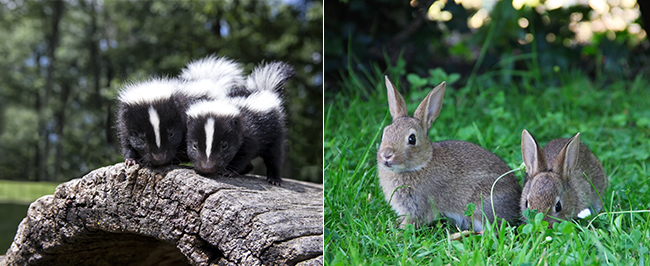
Anyone that spends a decent amount of time outdoors has probably seen an adorable wild animal out in nature at some point or another. A little bunny, a sweet chipmunk, or maybe even a salamander, a frog, or raccoon might have made you swoon and wish you could take the creature home to raise as a pet. Unfortunately while Hollywoo might fool us into thinking that caring for a wild animal would be ideal, this is rarely the case. Here are five reasons why raising a wild animal is a bad idea.
Reasons Not to Keep a Wild Animal
- It is illegal. In most states it is illegal to raise a wild animal, or to keep an undomesticated pet in captivity. This could include anything from wild wolf pups, to crocodiles, to squirrels, possums and deer. Even owning what could be considered dangerous “exotic” animals (such as monkeys or venomous snakes) is interdicted. If you have any doubts about the laws in your area, contact the local wildlife management agency and find out what specifically applies to your state.
- Animals carry diseases. A further safety concern is that, people who bring wild animals home are subjecting themselves to potentially dangerous diseases. The Center for Disease Control and Prevention (CDCP) notes that skunks and raccoons could be rabid without exhibiting any symptoms, and there are thousands of people who become infected with salmonella every year when they take frogs and other reptiles home.
- They become hard to control. Baby animals seem harmless and easy to manage, especially if they are found when young enough to be bottle-fed. However, when they grow up these animals then tap into instinctive actions and behaviors that make them very difficult to control, monitor and train. The fur-baby you once rocked to sleep might now be turning your house into a jungle gym, and wreaking havoc on your furniture at best, or attacking your other pets at worst!
- It is not safe for people and other pets. Wild animals are Failing to remember this fact causes humans to let their guard down, imaging a creature to be just like other domestic pet simply because they seem to behave like them most of the time. Animals that were born in the wild are descended from animals whose instincts are to hunt, scavenge, fight and defend themselves. They can be scrappy, aggressive and even violent if they feel threatened or cornered. An animal that might appear docile and sweet one moment could lash out or hurt someone the next.
- It is not good for the animal. Once a pet owner realizes the task of caring for an adult wild animal is beyond them, may people choose to release the creature back into the wild. This is puts the animal in a terrible position, as he has had no chance to gain the normal skills it would take a creature to survive by himself. By returning the pet to his natural habitat, he would be vulnerable to predators and at a disadvantage and out of practice when it comes to providing for himself.
For owners who decide to keep the animal, the pet is then subjected to a life of captivity when his kind has not been domesticated before. It would be far better to adopt a dog, or a cat (even a Fennec fox from an official breeder, or an exotic Bengal cat, as both of which have been domesticated over the years.
Tip: Don’t let your heart mislead you! If a lone baby bunny or a coyote pup appears to be abandoned, he might actually be perfectly fine. Many mothers leave their young unattended while they hunt or search for food, and may return shortly to care for them. Don’t fall in love with the “cuteness” of such an animal by trying to bring him home. Rather, if you have reason to believe the animal might be orphaned, or without the proper care, call the local wildlife center and ask their advice about how to get the creature some help.
Resources:
http://www.onegreenplanet.org/animalsandnature/reasons-why-you-should-never-rescue-wildlife-to-keep-as-pets/
http://www.mnn.com/family/pets/blogs/5-reasons-why-you-shouldnt-raise-wild-animals-as-pets
http://www.paws.org/library/wildlife/keeping-wild-animals/

